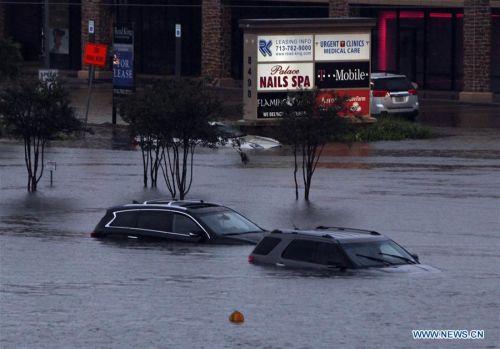
Vehicles are submerged in flood in great Houston area, Texas, the United States, Aug. 27, 2017 as the Hurricane Harvey made its strong landfall over the Texas Gulf Coast Friday night. Widespread and worsening flood conditions prompted the closure of nearly every major road in Houston as the outer bands of Harvey swept through the Houston area over the weekend. Latest news reports said the storm death toll has climbed to at least 5. (Xinhua/Song Qiong)
WASHINGTON, Sept. 17 (Xinhua) -- U.S. Secretary of State Rex Tillerson said on Sunday that the United States could stay in the Paris Agreement on climate change under right conditions.
"Under the right conditions, the president said he's open to finding those conditions where we can remain engaged with others in what we all agree is a challenging issue," said Tillerson in an interview with CBS.
Tillerson's remarks were in line with previous statements from the U.S. State Department which said that the United States is "open to re-engaging in the Paris Agreement if the United States can identify terms that are more favorable to it, its business, its workers, its people, and its taxpayers."
U.S. President Donald Trump on June 1 announced his decision to withdraw from Paris Agreement, citing concerns about the accord's threat to the U.S. economy as a main reason for the withdrawal.
"The cost to the economy at this time (by 2040) would be close to 3 trillion U.S. dollars in lost GDP and 6.5 million industrial jobs," said Trump then, citing figures from a disputed study commissioned by the American Council for Capital Formation and the U.S. Chamber of Commerce, both known for lobbying against climate regulations.
The decision to withdraw fulfilled a crucial campaign promise by Trump, who once called climate change "a hoax."
In fact, before he announced his decision to withdraw from the Paris Agreement, Trump had already taken a series of actions aimed at reversing his predecessor Barack Obama's climate policies.
In March, with coal miners standing by, Trump signed an executive order mainly targeting the Clean Power Plan, a signature effort by Obama to reduce greenhouse gas emissions from coal-fired power plants in keeping with U.S. promises of the Paris Agreement.
In his first budget request, Trump also proposed a 31 percent reduction in funding the U.S. Environment Protection Agency.
Yet, despite his decision to leave the Paris Agreement, Trump would stick to the four-year-long withdrawal process stipulated by the Paris Agreement, which means that the U.S. withdrawal won't take effect till November 2020, about two months away from the end of his first term.




 A single purchase
A single purchase









